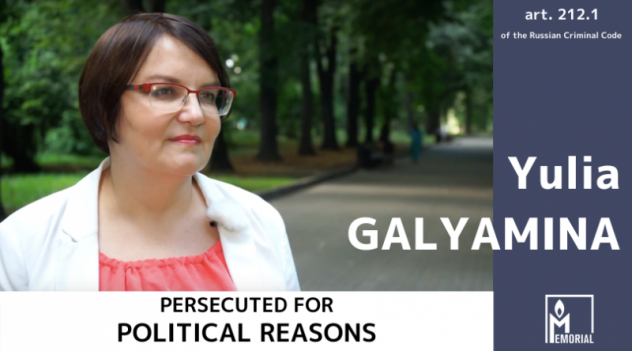The prosecution of Yulia Galyamina is unlawful and politically motivated, Memorial says
Moscow district council member Yulia Galyamina is the first opposition leader to be prosecuted under the so-called ‘Dadin’ article of the Russian Criminal Code
Memorial Human Rights Centre considers Yulia Galyamina a victim of unlawful, politically-motivated prosecution. We demand an immediate end to her criminal prosecution and the dropping of all charges against her under the repressive ‘Dadin’ article – Article 212.1 of the Russian Criminal Code (repeated violation of the established procedure for organising or conducting an assembly, rally, demonstration, march or picket).
Who is Yulia Galyamina?
Yulia Galyamina has a PhD in philology and previously taught at Moscow State University and the Higher School of Economics. She is a local councillor for the Timiryazevsky district in Moscow and founder of the independent newspaper, Nash Sever. She has been a candidate in elections to the Moscow city assembly and the State Duma and is one of the leaders of Moscow's democratic opposition.
On 31 July 2020 the Investigative Committee said Galyamina was under investigation with respect to an offence under Article 212.1 of the Russian Criminal Code. The same day, Galyamina's apartment and dacha were searched and she was brought in for questioning and charged. Travel restrictions were imposed on Galyamina as a pre-trial restrictive measure.
Galyamina has been charged with urging people via her Facebook page to participate in protests over the refusal to allow opposition candidates to take part in the Moscow city assembly elections; with participating in three protests on the same issue in July 2019; and with urging people via social networks to go to Pushkin Square in Moscow on 15 July 2020 to collect signatures against the ‘nullification’ of Vladimir Putin’s terms in office which would allow him to continue to stand for election as president after the end of his current term.
Why Memorial considers Galyamina’s prosecution politically motivated
The very fact that criminal proceedings were initiated against Galyamina under the unlawful and unconstitutional Article 212.1 of the Russian Criminal Code allows us to say that her prosecution was unlawful and politically motivated. Article 212.1, as well as Part 8 of Article 20.2 of the Russian Code of Administrative Offences (repeated violation by a participant in a public event of the established procedure for holding a picket), contradicts fundamental principles of law and is aimed at restricting the right of assembly and forcing critics of those currently in power to end their public activities.
Moreover, Galyamina’s prosecution is being conducted using a highly controversial interpretation of the ruling of the Russian Constitutional Court on the case of Ildar Dadin: a new offence, the commission of which may entail individual criminal liability, may be committed within the course of a year, rather than 180 days, after rulings convicting a person of an administrative offence have entered into force.
Article 212.1 of the Russian Criminal Code has been strongly criticised by Memorial Human Rights Centre, Amnesty International, the head of the Presidential Human Rights Council and the Federal Human Rights Ombudsman.
The political motive for Galyamina’s prosecution can be traced back to the investigators’ interpretation of the actions of which she has been accused - the organisation of, and participation in, public protests against the current authorities. These accusations fit into the broader context of Galyamina's activities: after she was denied registration as a candidate in the Moscow city assembly elections last year, Galyamina became a leader of the protest movement in Moscow. This resulted in her being repeatedly penalised for violations of administrative law, her home was searched and she was summoned as a witness in various criminal cases.
There is every reason to believe that the initiation of criminal proceedings against Galyamina is part of an on-going campaign to intimidate potential opposition candidates before the State Duma elections of 2021.
Further information about this case and the position taken by Memorial Human Rights Centre can be found on our website.
Recognition of an individual as a political prisoner or as a victim of politically motivated prosecution does not imply Memorial Human Rights Centre agrees with, or approves of, their views, statements, or actions.
- How you can help
Sign the online petition for the repeal of Article 212.1 of the Russian Criminal Code.
You can support all political prisoners by donating to the Fund to Support Political Prisoners of the Union of Solidarity with Political Prisoners via PayPal, using the e-wallet at [email protected]



